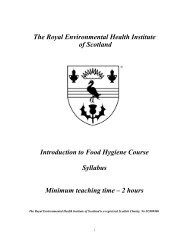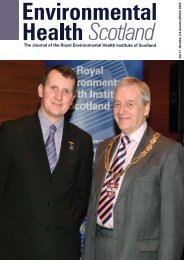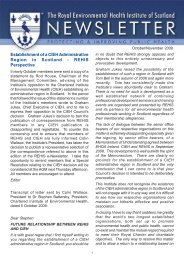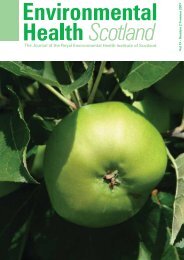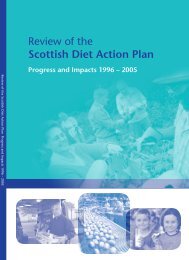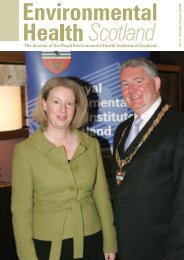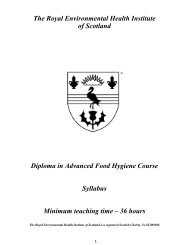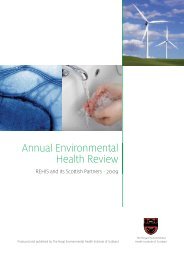Download REHIS Journal 20/2 (Summer 2008) - The Royal ...
Download REHIS Journal 20/2 (Summer 2008) - The Royal ...
Download REHIS Journal 20/2 (Summer 2008) - The Royal ...
You also want an ePaper? Increase the reach of your titles
YUMPU automatically turns print PDFs into web optimized ePapers that Google loves.
Environmental Health Scotlandfrom public places. It dispelled the notion that it wassimply a matter of individual choice and thereforeone chose to take a substance that was known to behazardous. However, when it became apparent thatothers: employees, family and particularly children,were seriously affected by other people’s smokingthen the nanny state argument began to lose its gripon the imagination.<strong>The</strong> evidence for alcohol having an impact onothers is much, much stronger and yet we tend still tothink about it as being a matter of individual choice.Social harm related to alcohol, or if you like ‘passive’drinking, is estimated to cost £1.1 billion. <strong>The</strong>re iswidespread public concern about alcohol misuse;a survey suggested that three out of five people seealcohol abuse as a serious issue, often quoting noise,disturbances in the street and violence as the sourceof their concern.<strong>The</strong> most recent European framework for alcoholpolicy stated ‘each member state has not only theright but also the obligation to provide a high level ofprotection to its citizens from alcohol related harm,particularly with regard to harm from others drinkingand harm to vulnerable groups such as children.’ Youngpeople are often unfairly depicted as the perpetratorsof alcohol problems rather than their victims.Alcohol is estimated to be a causal factor in 16%of cases of child abuse and neglect.<strong>The</strong> European Charter for Alcohol set down fiveethical principles and goals, one of which states‘all children and adolescents have the right to growup in an environment protected from the negativeconsequences of alcohol consumption and to the extentpossible from the provision of alcoholic beverages’.We are very far from adhering to this principlein Scotland.DeprivationAlcohol related deaths are not evenly distributedin the population and there is a clear associationbetween deprivation and alcohol related mortality,such that men living in the most deprived areasare seven times more likely to die an alcoholrelated death than those in the least deprived areas.Acute hospital admission rates with an alcoholdiagnosis are seven times higher in deprivation category7 than in category 1. It is also evident that thoseliving in the most deprived areas were twice as likelyto be admitted as a psychiatric in-patient with analcohol related diagnosis than those living in the leastdeprived areas.Why has the health burden increased in Scotland?Put simply it is because we are drinking more.<strong>The</strong> reasons for this are varied: some may be cultural14and others are pure economics. <strong>The</strong>re has been afall in the relative price of alcohol; it is much moreavailable than it has ever been with new retail outlets,the removal of restrictions on alcohol sales and theindustry is ever more active in promoting its wares.Concerned about the public health crisis, SHAAPin common with other groups such as AlcoholFocus Scotland has advocated a variety of evidencebasedapproaches that they believe would reducethe level of alcohol related harm in the community.One of these approaches is to raise the priceand reduce availability. Alcohol is much moreaffordable: 62% than it was in 1980, and therehave been large increases in the amounts ofalcohol bought in shops, supermarkets andoff licences. At a UK level the increased tax on alcoholshould have an impact on consumption. <strong>The</strong> evidencefrom the rest of Europe has suggested that a 10%rise in UK alcohol prices would produce a 7% maleand 8.3% female decrease in cirrhosis mortality(Norstrom et al <strong>20</strong>02).Recently there have been encouraging endeavoursat a national and community level to redress thisimbalance. <strong>The</strong> new Licensing Scotland Act shouldrestrict the capability of pubs and clubs to offerdrinks promotions at discounted prices and this willnow be extended to cover supermarkets, off licencesand corner shops. We hope that there will also be anagreement that will require alcohol to be displayedand sold separately from other goods, and thereshould be stricter enforcement of sales generally,with a particular focus on sales to under-age drinkers.Test purchasing has been a promising step forward inthis direction and should become a regular practice.Community perceptionIt has been my impression, borne out by recentsurveys, that the Scottish population is generallytired of the impact of alcohol on our communities,particularly in the city centres. Sixty per cent ofadults viewed alcohol as a serious issue, 46% saidthat people who were drunk or rowdy in public placeshad a serious effect on their own quality of life, andthis was most evident amongst people living in themost deprived areas. Those with responsibility forimproving health and the environment have a uniqueopportunity to collaborate with community groups toreduce the harm.<strong>The</strong>re are measures which can be taken which haveproven effectiveness: taxation has been mentioned,drink driving legislation, the introduction of a lowerdrink-drive limit to 50mg per cent would bring usinto line with almost all other countries in Europe,and perhaps most important of all in this respectwith the introduction of random breath testing.



